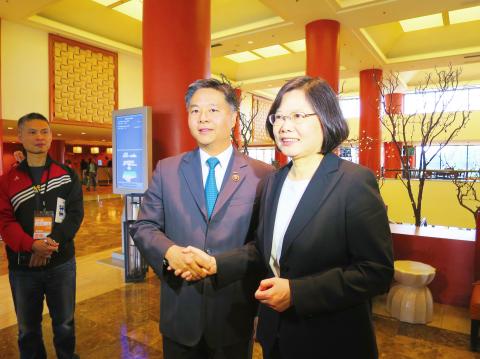Democratic Progressive Party (DPP) Chairperson Tsai Ing-wen (蔡英文) on Saturday held a closed-door forum with eight US academics in Los Angeles to discuss maintaining the cross-strait “status quo.”
Most attendees said the DPP presidential candidate’s proposals made sense, said Clayton Dube, director of the US-China Institute at the University of South California (USC) Annenberg School for Communication and Journalism.
However, Dube declined to elaborate on what Tsai discussed.

Photo: Chen Hui-ping, Taipei Times
DPP Secretary-General Joseph Wu (吳釗燮) told reporters that “what was discussed will not be made public.”
Asked the US’ view of the so-called “1992 consensus,” Dube said the US accepts whatever is agreed upon and conducted in peaceful means between Taiwan and China.
Stanley Rosen, a USC political science professor and member of the US-China Institute, and Wang Feng (王豐), a sociology professor at the University of California at Irvine, also attended the forum.
Tsai has previously said that maintaining the cross-strait “status quo” means maintaining peace, so both sides can pursue development amid peace and stability.
She has declined to support the “1992 consensus,” saying that the term became popular only in 2000, adding that even those who were involved in the Hong Kong negotiations in 1992 have expressed different views about it, as has former president Lee Teng-hui (李登輝).
Beijing on Wednesday last week said that Tsai had to clarify what she meant by “maintaining the status quo” if she were elected.
US Deputy Assistant Secretary of State for East Asian and Pacific Affairs Susan Thornton on May 21 said that, regardless of who wins Taiwan’s presidential election next year, the US “hopes to continue our close cooperation, and it must be said that an important ingredient of that close cooperation in recent years has been the stable management of cross-strait ties.”
Tsai arrived in Los Angeles on Friday for a six-city US tour.
On Saturday, she met with US Representative Ted Lieu (劉雲平), a Taiwanese-American whose grandparents still live in Taiwan, to discuss labor-related issues and the Trans-Pacific Partnership.
At a dinner party hosted for her by Taiwanese expatriates, Tsai said the focus of her cross-strait policy is maintaining the “status quo,” accenting that peaceful development of cross-strait ties would be her administration’s main goal if she were elected.
“I am not here for an interview,” she said, adding that the common language between Taiwan and the US is “democracy, democracy and democracy.”
The “1992 consensus” refers to a supposed tacit deal between the Chinese Nationalist Party (KMT) and Beijing that each acknowledges there is “one China,” with each side having its own interpretation of what “China” means.

The Ministry of the Interior (MOI) is to tighten rules for candidates running for public office, requiring them to declare that they do not hold a Chinese household registration or passport, and that they possess no other foreign citizenship. The requirement was set out in a draft amendment to the Enforcement Rules of the Public Officials Election and Recall Act (公職人員選舉罷免法 ) released by the ministry on Thursday. Under the proposal, candidates would need to make the declaration when submitting their registration forms, which would be published in the official election bulletin. The move follows the removal of several elected officials who were

The Republic of China (ROC) is celebrating its 114th Double Ten National Day today, featuring military parades and a variety of performances and speeches in front of the Presidential Office in Taipei. The Taiwan Taiko Association opened the celebrations with a 100-drummer performance, including young percussionists. As per tradition, an air force Mirage 2000 fighter jet flew over the Presidential Office as a part of the performance. The Honor Guards of the ROC and its marching band also heralded in a military parade. Students from Taichung's Shin Min High School then followed with a colorful performance using floral imagery to represent Taiwan's alternate name

COVETED PRIZE: The US president would be a peace prize laureate should he persuade Xi Jinping to abandon military aggression against Taiwan, William Lai said US President Donald Trump should get the Nobel Peace Prize should he be able to convince Chinese President Xi Jinping (習近平) to abandon the use of force against Taiwan, President William Lai (賴清德) told a conservative US radio show and podcast in an interview. The US is Taiwan’s most important international backer, despite the absence of formal ties, but since Trump took office earlier this year he has not announced any new arms sales to the nation. Trump could meet Xi at the APEC summit in South Korea on Oct. 31 and Nov. 1. Lai, speaking on The Clay Travis and Buck Sexton

A Chinese takeover of Taiwan would severely threaten the national security of the US, Japan, the Philippines and other nations, while global economic losses could reach US$10 trillion, National Security Council Deputy Secretary-General Lin Fei-fan (林飛帆) wrote in an article published yesterday in Foreign Affairs. “The future of Taiwan is not merely a regional concern; it is a test of whether the international order can withstand the pressure of authoritarian expansionism,” Lin wrote in the article titled “Taiwan’s Plan for Peace Through Strength — How Investments in Resilience Can Deter Beijing.” Chinese President Xi Jinping’s (習近平) intent to take Taiwan by force